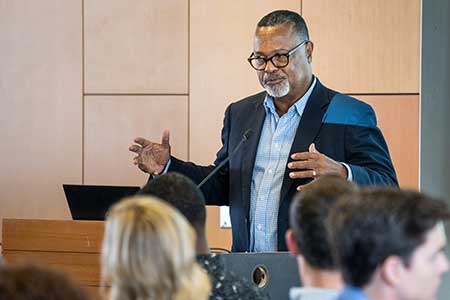Ethnographer describes the heavy toll on black people who navigate 'white spaces'

Editor's note: This story is being highlighted in ASU Now's year in review. Read more top stories from 2018 here.
Every day, black people have to navigate in “white spaces,” dispelling stereotypes and convincing everyone that they’re worthy.
It’s hard work, according to Elijah Anderson, a Yale University sociology professor who studies race relations.
“You have to disabuse people of the idea that their ghetto stereotypes apply to you. You have to do a dance to demonstrate that you’re educated, that you’re clean, that you’re not a gangster,” he said.
“You have to be on good behavior to gain people's trust. Your work is never done,” said Anderson, who was the speaker at the kickoffThe event was co-sponsored by the T. Denny Sanford School of Social and Family Dynamics. event of the Global Sport Institute's yearlong theme at Arizona State University on Tuesday.
AndersonAnderson is the William K. Lanman Jr. Professor of Sociology at Yale University, and also is a professor of African-American studies. is an ethnographer — someone who studies culture from the point of view of people in it.
“As an ethnographer I’ve talked to a lot of people, and this is why some black people are reluctant to engage in white spaces — it’s a lot of work.”
As a professor at an Ivy League university and author of several books, Anderson navigates in white spaces all the time, he said. His interest in ethnography goes back to his school days, when he was desperate to be on the basketball team and didn’t make it.
“You’re working so hard and after two or three weeks, the coach puts the list up. How do you face your friends? It hurts. I can still feel it,” he said.
“I realized when I got cut that I couldn’t be with the boys who were getting scholarships. I had to find another way to keep up with them, so I began to hit the books.”
Anderson said he has been on the margins all his life.
“It’s allowed me to empathize, to put myself in the place of other people,” he said.
“In order to deal with people in a humane way, we have to develop the ability to empathize and to see things from their perspective.”
Anderson said that while there are “white spaces” in our culture, there are also “black spaces” and “canopy spaces,” which are racially mixed. All too often, black people in canopy spaces will face a shocking, unexpected moment of deep disrespect based on race.
“In the canopy places you don’t expect it and when it happens it throws you off. It’s a racial setback,” said Anderson, who is exploring the concept further in an upcoming book.
“It can be a little moment or it can be a big one, and the big ones can get you killed.”

Ken Shropshire, CEO of the Global Sport Institute (shown speaking at Tuesday's event), said the theme for this year will be "Race and Sport Around the Globe." Photo by Charlie Leight/ASU Now
The Global Sport Institute is embracing the theme of “Race and Sport Around the Globe” this year, according to Ken Shropshire, CEO of the institute and the adidas Distinguished Professor of Global Sport at ASU.
The institute will hold two events to mark the 50th anniversary of the 1968 Olympics in Mexico City, when two black American athletes raised black-gloved fists during the medal ceremony for the 200-meter race. Tommie Smith, who won the gold, and John Carlos, who won the bronze, were banned for life by the International Olympic Committee.
The institute is sponsoring a discussion at 6 p.m. Sept. 24 at Ciudad Universitaria in Mexico City that will be livestreamed.
Carlos will attend a Global Sport Institute event called “Raising a Fist to Taking a Knee” at 6:30 p.m. Oct. 23 at the Phoenix Art Museum. Co-sponsored by the Center for the Study of Race and Democracy, the event also will feature Gina Hemphill-Strachan, Jesse Owens’ granddaughter and an ASU alum, as well as Wyomia Tyus, who won her second consecutive 100-meter Olympic gold medal in Mexico City.
Besides the signature events, the institute is also offering seed grants of up to $20,000 to research projects in fields that impact sports, sports product and health. Currently funded research includes an investigation of why Latina girls lag in sports participation and a prototype design of shoes that can track foot-ankle mechanics.
In addition, the institute funds the Global Sport Venture Challenge, for a sports-related startup, and the Global Sport Social Impact Challenge, which supports programs designed to positively shape the world, such as forming a nonprofit, starting a league or bringing a new sport to an area that doesn’t have access to it.
“We want people to know there are a lot of different ways to be engaged with us,” Shropshire said.
Top photo: Yale University ethnographer Elijah Anderson addressed the audience at the kickoff event Tuesday for the Global Sport Institute yearlong theme of “Race and Sport Around the Globe.” Photo by Charlie Leight/ASU Now
More Arts, humanities and education

Grammy-winning producer Timbaland to headline ASU music industry conference
The Arizona State University Popular Music program’s Music Industry Career Conference is set to provide students with exposure to exciting career opportunities, music professionals and industry…

ASU Gammage brings the best of Broadway to the 2025–26 season
ASU Gammage has announced its 2025–2026 Desert Financial Broadway Across America-Arizona season with a lineup of Broadway shows that includes a mix of new productions, classics and comedies. “…

March Mammal Madness hypes science, storytelling in the classroom and beyond
In classrooms throughout the country, the buzz around March Mammal Madness starts long before the tournament begins. For middle school science teacher Jessica Harris, students wonder which…